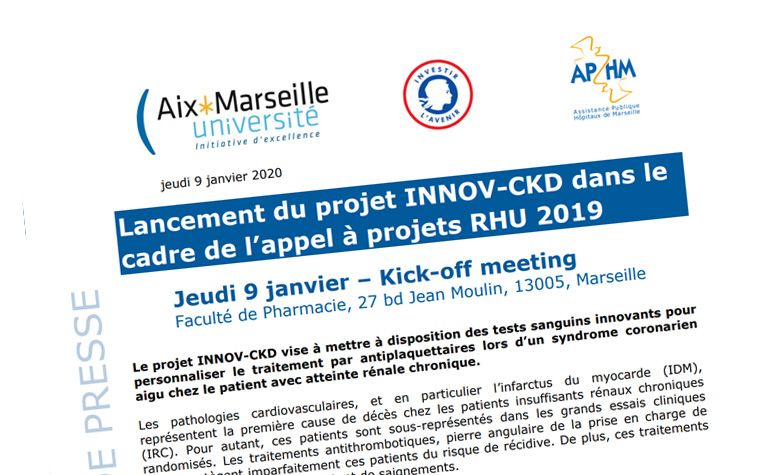
The INNOV-CKD project aims to provide innovative blood tests to personalize antiplatelet therapy in acute coronary syndrome in patients with chronic kidney disease.
Thursday 9 January - Kick-off meeting
Faculty of Pharmacy, 27 bd Jean Moulin, 13005, Marseille
Cardiovascular pathologies, and in particular myocardial infarction (MI), are the leading cause of death in patients with chronic kidney disease (CKD). However, these patients are under-represented in large randomized clinical trials. Antithrombotic therapies, the cornerstone of IDM management, do a poor job of protecting these patients from the risk of recurrence. In addition, these treatments expose them to a significant risk of bleeding.
In this context, the personalisation of antithrombotic treatment according to the individual risk of thrombosis and bleeding is a major issue.
The INNOV-CKD project, led by Professor Laurent Bonello, cardiologist at the APHM, aims to provide clinicians with blood tests that will make it possible to personalize antithrombotic treatment, to improve the survival and quality of life of patients while reducing healthcare costs.
Two innovative complementary tests targeting platelets and vascular endothelium will be developed to assess vascular integrity and measure the risk of thrombosis and hemorrhage in CKD patients. The ultimate goal is to automate and validate them in two clinical studies prior to their use by healthcare professionals.
The INNOV-CKD project is built around a robust consortium between the research teams of the Cardiovascular and Nutrition Research Center (C2VN, Campus Santé, Aix-Marseille University), several APHM departments recognized in hemostasis, vascular pathophysiology, nephrology and cardiology, and leading hemostasis companies in biotechnology (BioCytex) and in vitro diagnostics (Diagnostica Stago). The project also involves experts in the production and selection of nanobodies. Methodologists, statisticians, and project managers will ensure the proper conduct of clinical trials.
In the long term, the expected benefits are at the level of practitioners, patients and the socio-economic level. They are part of the development of "personalized medicine with a vascular focus". On the practitioners' side, it will become possible to determine the best preventive strategy and duration of treatment according to the best benefit-risk profile of the patient. On the patients' side, medical complications will be reduced in the short and long term, positively impacting their comfort and life expectancy. The effective management of at-risk and hospitalized patients, which represents a high economic burden on health care systems, will have a significant impact on health costs and medico-economic gain.

